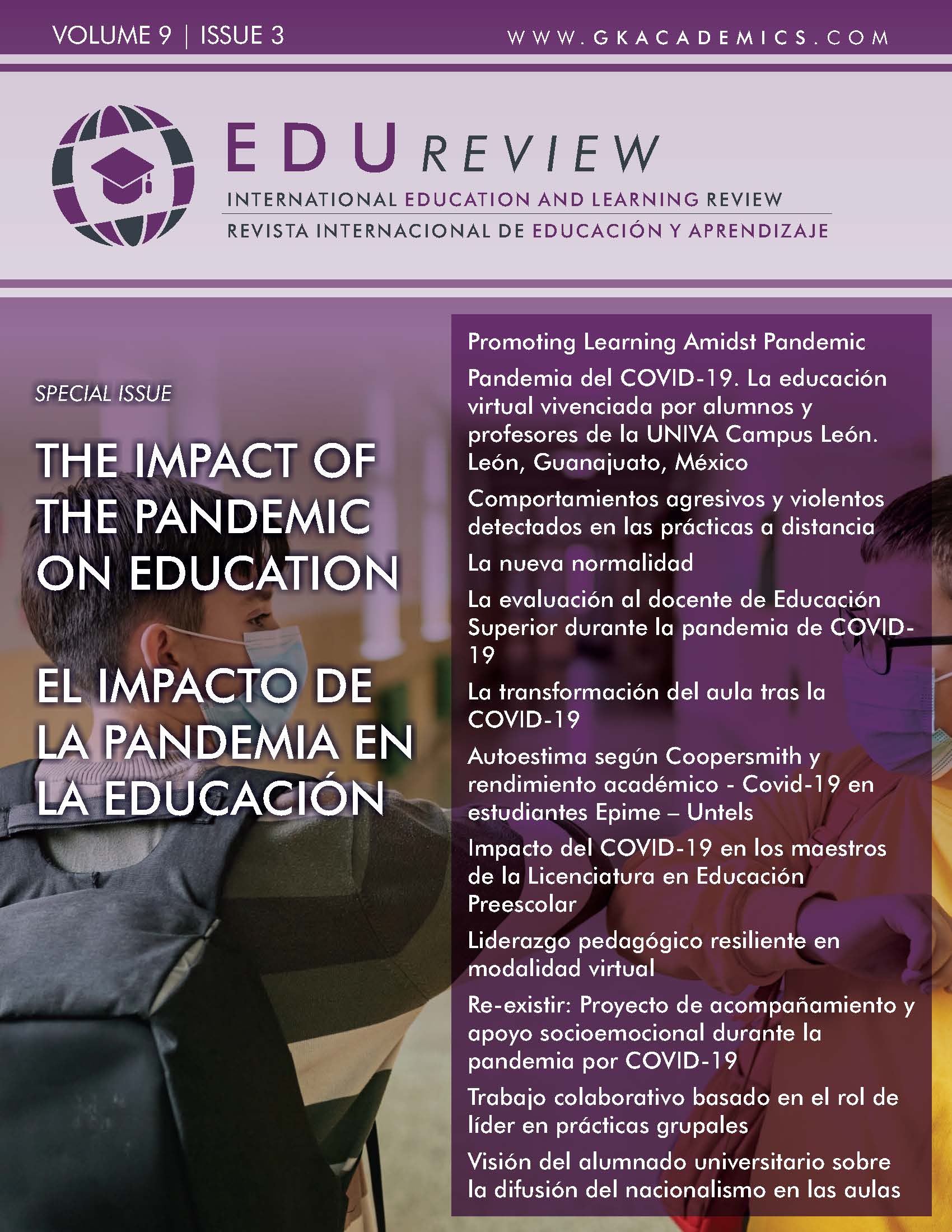Self-esteem According to Coopersmith and Academic Performance Covid-19, in EPIME Students -UNTELS
DOI:
https://doi.org/10.37467/gkarevedu.v9.2989Keywords:
Self-esteem, Academic performance, CoopersmithAbstract
The purpose of the research is to verify if self-esteem in times of Covid-19 influences academic performance in EPIME students from UNTELS. The research is correlational, descriptive, observational, and multivariate. The validity and reliability of the Coopersmith Self-Esteem Inventory, adapted by Chahuayo & Diaz (2017) was verified. The results reveal that self-esteem directly influences academic performance with a correlation of 95.63%. In conclusion, academic performance is very poor and is related to self-esteem, which does not allow personal change, which causes a loss of self-confidence.
Downloads
Global Statistics ℹ️
|
5681
Views
|
6211
Downloads
|
|
11892
Total
|
|
References
Calderón, P. & Alzamora, L. (2010). Estadística para la tesis de post Grado. LULU International.
Charaja, F. (2015). El MAPIC en la Metodología de la Investigación (1ª edición 2009). Sagitario Impresores.
Chilca Alva, M. L. (2017b). Autoestima, hábitos de estudio y rendimiento académico en estudiantes universitarios. Propósitos y Representaciones, 5(1), 71-127. https://doi.org/10.20511/pyr2017.v5n1.145 DOI: https://doi.org/10.20511/pyr2017.v5n1.145
Coopersmith, S. (2017). Inventario Autoestima Stanley Coopersmith (A. Chahuayo & B. Diaz, Eds.). https://kupdf.net/download/inventario-autoestima-stanley- coopersmith_5af6fcf1e2b6f546408bd9b8_pdf.
Dávila, G. & Dávila, M. (2000). Metodología de la Investigación. Grupo Editorial Patria.
Fernández González, O. M., Martínez-Conde Beluzan, M., & Melipillán Araneda, R. (2009). Estrategias de aprendizaje y autoestima: su relación con la permanencia y deserción universitaria. Estudios pedagógicos (Valdivia), 35(1), 27-45. https://doi.org/10.4067/S0718-07052009000100002. DOI: https://doi.org/10.4067/S0718-07052009000100002
González Arrarte, K. M., & Guevara Cordero, C. (2016). Autoestima en los universitarios ingresantes de la facultad de medicina de la Universidad Nacional Mayor de San Marcos durante el año 2015. Revista de Investigación Apuntes Psicológicos, 1(1), 8-20. https://revistas.upeu.edu.pe/index.php/ri_apsicologia/article/view/871.
Hernández, R. Fernández, C. & Pilar Baptista, M. (2014). Metodología de la investigación. McGraw-Hill.
Herrera, C., Perego, N. & Garza, Á. (2012). Los hábitos de estudio y motivación para el aprendizaje de los alumnos en tres carreras de ingeniería. XLI, 3, N° 163, 67-87.
Kline, P. (2013). Personality: The Psychometric View (2008.a ed.). Routledge. https://books.google.com.pe/books?id=bTb2IyhQY0kC&printsec=frontcover&hl=es&source=gbs_ge_summary_r&cad=0#v=onepage&q&f=false. DOI: https://doi.org/10.4324/9780203168431
Lara Cantú, A., Verduzco, A., Acevedo, M., & Cortéz, J. (1993). Validez y confiabilidad del Inventario de Autoestima de Coopersmith para Adultos, en Población Mexicana. Revista Latinoamericana de Psicología, 25(2), 247-255.
Loli Pineda, A., & López Vega, E. (1998). Autoestima y valores en la calidad y la excelencia. Revista de Investigación en Psicología, 1(1), 89-117. https://doi.org/10.15381/rinvp.v1i1.4584 DOI: https://doi.org/10.15381/rinvp.v1i1.4584
Loli Pineda, A., & López Vega, E. (2001). Inventario de autoestima para adultos ALPEL FORMA - AD. Revista de Investigación en Psicología, 4(1), 67-83. https://doi.org/10.15381/rinvp.v4i1.5010 DOI: https://doi.org/10.15381/rinvp.v4i1.5010
Martínez Miguélez, M. (2006). Validez y confiabilidad en la metodología cualitativa. Paradígma, 27(2), 07-33.
Mondragón Albarrán, C. M., Cardoso Jiménez, D., & Bobadilla Beltrán, S. (2017). Hábitos de estudio y rendimiento académico. Caso estudiantes de la licenciatura en Administración de la Unidad Académica Profesional Tejupilco, 2016 / Study habits and academic performance: A research study of Business Administration undergraduate students at the Tejupilco Professional Academic Unit, 2016. RIDE Revista Iberoamericana para la Investigación y el Desarrollo Educativo, 8(15), 661-685. https://doi.org/10.23913/ride.v8i15.315. DOI: https://doi.org/10.23913/ride.v8i15.315
Mruk, C. (1998). Autoestima: Investigación, teoría y práctica. Desclée de Brouwer. https://dialnet.unirioja.es/servlet/libro?codigo=212419
Pineda Lezama, O. B., & Alcántara Galdámez, N. J. (2018). Hábitos de estudio y rendimiento académico en estudiantes universitarios. Innovare: Revista de ciencia y tecnología, 6(2), 19-34. https://doi.org/10.5377/innovare.v6i2.5569. DOI: https://doi.org/10.5377/innovare.v6i2.5569
Zárate, Eliana Carina, Muñoz, Elina Nora y Fantin, Marina Beatriz (2017). La motivación hacia el aprendizaje y su relación con la autoestima. IX Congreso Internacional de Investigación y Práctica Profesional en Psicología XXIV Jornadas de Investigación XIII Encuentro de Investigadores en Psicología del MERCOSUR. Facultad de Psicología - Universidad de Buenos Aires, Buenos Aires. https://www.aacademica.org/000-067/609.
Downloads
Published
How to Cite
Issue
Section
License
Those authors who publish in this journal accept the following terms:
-
Authors retain copyright.
-
Authors transfer to the journal the right of first publication. The journal also owns the publishing rights.
-
All published contents are governed by an Attribution-NoDerivatives 4.0 International License.
Access the informative version and legal text of the license. By virtue of this, third parties are allowed to use what is published as long as they mention the authorship of the work and the first publication in this journal. If you transform the material, you may not distribute the modified work. -
Authors may make other independent and additional contractual arrangements for non-exclusive distribution of the version of the article published in this journal (e.g., inclusion in an institutional repository or publication in a book) as long as they clearly indicate that the work was first published in this journal.
- Authors are allowed and recommended to publish their work on the Internet (for example on institutional and personal websites), following the publication of, and referencing the journal, as this could lead to constructive exchanges and a more extensive and quick circulation of published works (see The Effect of Open Access).













